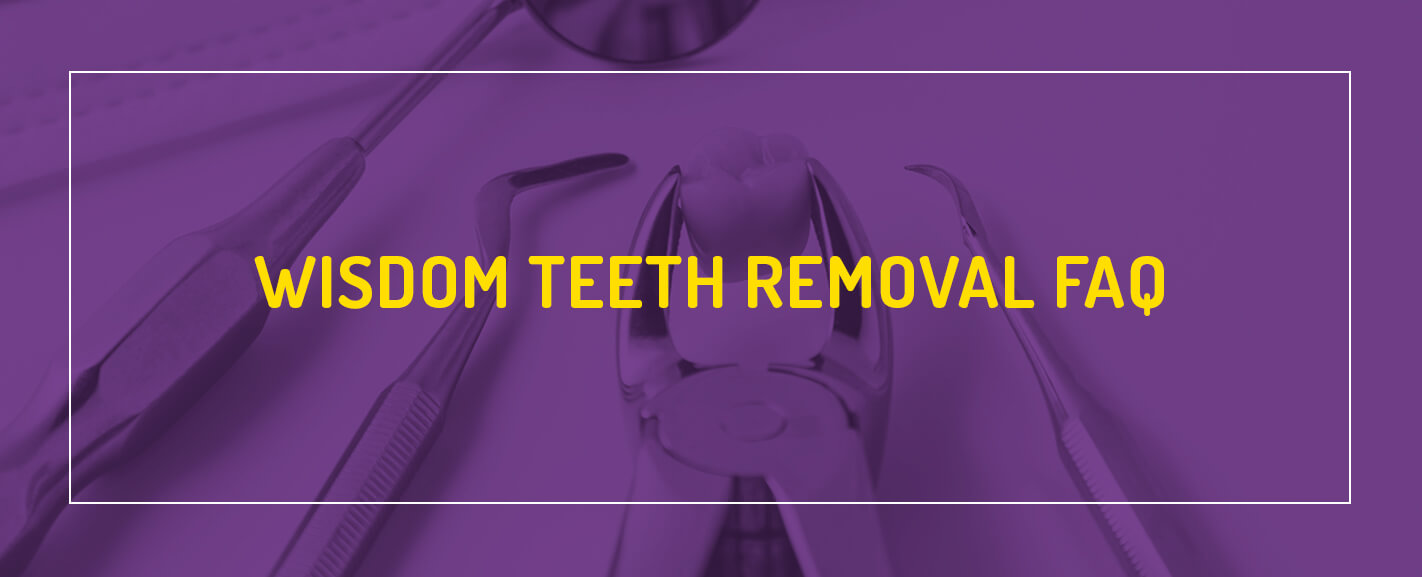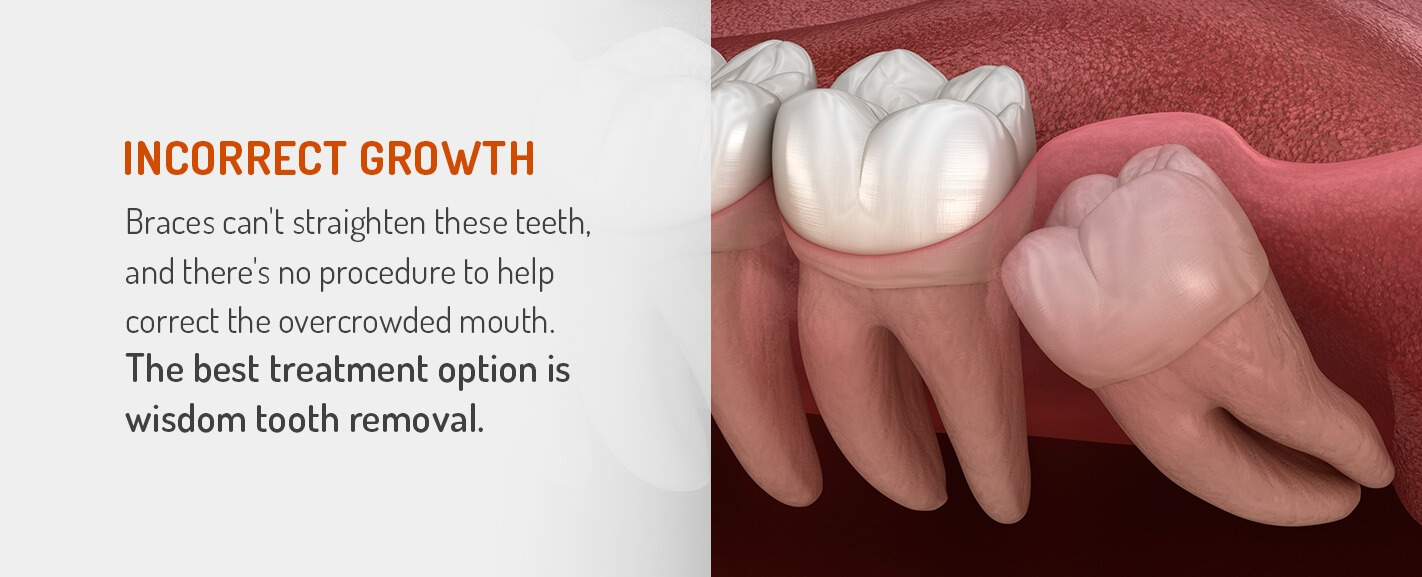Wisdom teeth extraction is a common outpatient surgery, but many patients and their parents have questions before and after a wisdom teeth removal procedure.
Contact Us To Learn More About Wisdom Teeth Removal
Below, we’ll answer some of the most frequently asked questions about wisdom teeth removal to help you and your teen feel prepared.
Wisdom Teeth Extraction 101: Common Removal & Recovery Questions
Some common wisdom tooth removal questions and answers are:
1. What Are Wisdom Teeth?
Wisdom teeth are your teen’s third and last set of molars. While it is possible for wisdom teeth to grow in properly aligned and healthy, most often, they become impacted, or grow in just partially. In these situations, the risk of infection is high, which is why removal is recommended.
2. At What Age Do Wisdom Teeth Come In?
If there is enough room in the mouth for wisdom teeth it grow in, they tend to erupt when you’re between 17 and 25 years old.
3. Does it Hurt When Wisdom Teeth Grow In?
Your teen may experience mild pain or tenderness before there are even any signs of tooth eruption. This discomfort may last a few weeks, or even months, while the tooth is growing and breaking through the gum. In a way, your teen is teething for the last time. For most people who have room for their wisdom teeth to grow in, pain is usually minimal or none. Pain usually will only arise if an infection has occurred.
4. Do I Need My Wisdom Teeth Removed?
Most individuals do not have room in their jaw for wisdom teeth to fully erupt. Your child’s dentist can often anticipate this based off of jaw bone anatomy as seen on a routine panoramic x-ray.
Each individual is different, but generally, wisdom teeth might require removal when the dentist sees evidence of mouth changes like:
- Infection
- Pain
- Gum disease
- Damage to surrounding teeth
- Tooth decay
- Tumors
- Cysts
The dentist might also suggest wisdom teeth removal as part of your teen’s braces treatment or other dental care.
5. What Are the Signs and Reasons Your Teen May Need Their Wisdom Teeth Taken Out?
Impacted wisdom teeth can lead to damage to other teeth, pain and other dental issues, which is why, in some cases, wisdom teeth removal is necessary. Some signs your teen might need their wisdom teeth removed are:
- Irritation and pain: Oral pain and irritation are common signs wisdom teeth need to come out. However, pain could also be related to another problem, so it’s best to have your teen be seen by a dentist immediately after they start experiencing pain.
- Impacted wisdom teeth: Sometimes, a teen’s wisdom tooth can become impacted, and there’s not enough room for it to emerge from the gums and grow in normally. This can cause symptoms like bad breath and tender, swollen or bleeding gums. Your teen may also experience jaw pain, stiffness or swelling. While there are cases where impacted wisdom teeth don’t cause any symptoms, dentists might recommend impacted wisdom tooth removal to prevent future issues.
- Incorrect growth: Sometimes, wisdom teeth can grow in and take up a lot of space. Braces can’t straighten these teeth, and there’s no procedure to help correct the overcrowded mouth. The best treatment option is wisdom tooth removal.
6. At What Age Are Wisdom Teeth Removed?
Most patients are around age 16-22 when wisdom teeth are removed. The best time to remove wisdom teeth is when the tooth is about 1/2 to 3/4 of the potential full size of the tooth.
When removed too early, it can be challenging for the oral surgeon to grasp onto the developing tooth. Alternatively, if a wisdom tooth is full size, there is increased risk of root breakage or nerve damage.
7. How Long Do You Bleed After Wisdom Teeth Removal?
Your teen may experience minor bleeding for several hours after they have their wisdom teeth removed. However, when the procedure is done properly and by well trained oral surgeons, bleeding is less and can be well controlled with sutures (or stitches), as well as special dressings.
8. When and What Can I Eat After Wisdom Teeth Removal?
Have your teen follow their dentist’s or oral surgeon’s instructions regarding diet. Usually, it’s fine to eat soft foods at first and gradually transition to more solid foods. But, your teen should avoid foods that are spicy, hard or difficult to chew.
9. How Long Does It Take to Heal From a Wisdom Tooth Extraction?
Most individuals recover within three to four days after wisdom tooth surgery. It could take longer if the teeth were impacted. Teen patients usually heal faster than older adults.
10. What Is the Wisdom Teeth Removal Process Like?
Wisdom teeth removal is best performed by an oral surgeon. Oral surgeons are dental specialists who are the most qualified to extract wisdom teeth. They can handle both routine and more complicated cases.
During wisdom teeth removal, the oral surgeon will provide your teenager with anesthesia and make an incision in the gum tissue to expose the tooth and bone. The oral surgeon will remove the tooth, clean the site and stitch the wound to promote healing. Lastly, the surgeon places gauze over the wound to help a blood clot form.
Most patients opt to be sedated or put to sleep during the wisdom tooth removal process. However, there may also be the options to use nitrous oxide and local anesthesia. Be sure to discuss these options with your oral surgeon during your consultation appointment.
Call to Schedule An Appointment
11. What To Expect During Wisdom Teeth Recovery?
Here’s how the typical wisdom teeth removal recovery process goes and what to expect:
- Your teen may experience some minor swelling and pain once the anesthesia wears off. There may be a small amount of blood in their mouth on the first day of their recovery.
- Your teen should fully recover in three to four days unless their teeth were impacted — then it could take a whole week.
- Your teen will initially consume only liquids and soft foods. They should chew away from the surgical sites when they start eating more solid foods. Ensure your teen drinks plenty of fluids to stay hydrated and limits their food intake for the first several days.
Unless they develop any postoperative complications, your teen should be able to return to school within a couple of days of their wisdom tooth extraction.
12. What Are Some Wisdom Tooth Extraction Recovery Tips?
Here are some wisdom teeth removal aftercare tips to follow.
- Keep the gauze pad over the surgical site for about 45 minutes, then remove and discard it.
- Make sure your teen doesn’t touch the wound site or rinse their mouth vigorously following the surgery since this could cause bleeding and dislodge the blood clot.
- Take all prescribed medications as directed when they feel discomfort.
- Restrict their activities on the same day as their surgery and resume regular activity only when they feel comfortable.
- Avoid letting them drink from a straw, smoke or spit since these actions can dislodge the blood clot and cause dry socket, which is very painful.
- Keep them eating well and hydrated. Ask the oral surgeon or dentist for instructions on what to eat after surgery. Start with soft foods like pudding, cottage cheese, smoothies, applesauce and soup. Avoid spicy, hot foods and seeds or nuts that could get stuck in the wound.
By ensuring your teen follows these wisdom tooth removal tips, they’ll be well on their way to recovering in several days after their procedure.
About Fox Kids Dentistry & Orthodontics
Fox Kids Dentistry & Orthodontics is a dual-specialty pediatric and orthodontics practice located in Portland, OR.
Does your child need a dental checkup or orthodontic evaluation? Call us at 503-223-5039 to schedule your visit!



